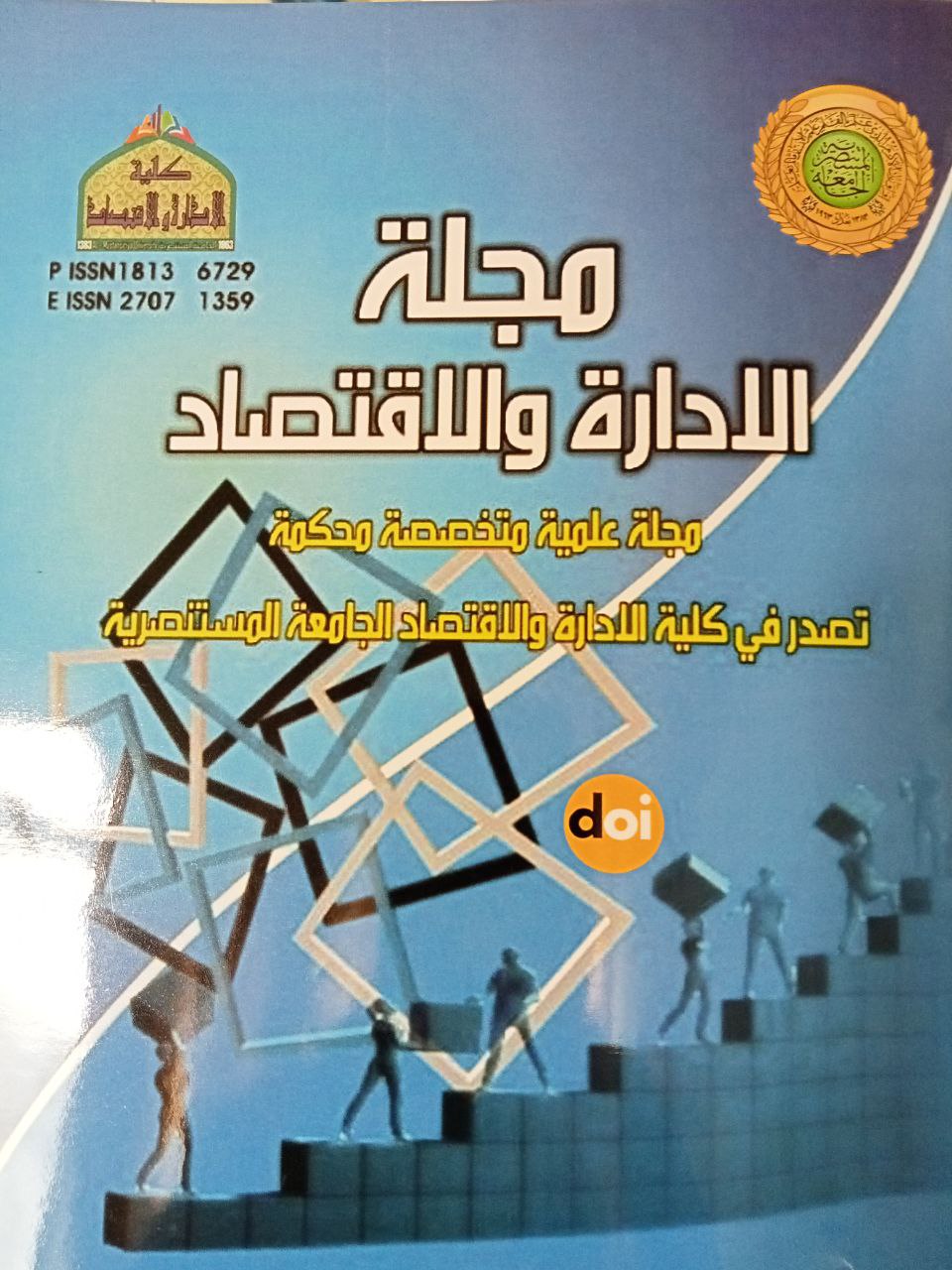The impact of the Turkish economic crisis on the Iraqi economy
DOI:
https://doi.org/10.31272/jae.i127.111الكلمات المفتاحية:
economic crisis، Foreign Currency، Commercial Policies، Exports، Importsالملخص
Iraqi-Turkish relations are witnessing a qualitative leap at the level of political and economic relations, due to the economic intertwining between the two countries, as Iraq for years occupies advanced ranks in the volume of imports from Turkey and thus it represents an indicator that is distinguished from other indicators as it reflects the impact of the economic crisis facing Turkey must be transmitted to the Iraqi economy and as a result of this intertwining of economic relations, it was necessary to study these relations to find out the extent to which Iraq was affected by the Turkish economic crisis, and accordingly the research started from the hypothesis that the Turkish crisis will affect some of the Iraqi macroeconomic variables, and the research concluded: The crisis affects the Iraqi Central Bank’s policy and this is clear through the effect on the window of selling foreign currency, as the standard results showed that the decrease in the Turkish lira exchange rate led to an increase in Iraq's imports from Turkey and then increased the demand for foreign currency, and then included in a number of recommendations, the most important of which is, Iraq must adopt commercial policies, which reduces its exposure to its trading partners, especially Turkey, and improves its trade balance towards them by taking advantage of lower prices of their currencies to enhance its imports of investment goods that would enhance its national production, thereby reducing its imports.
المراجع
1. Iraq must be hedged against the economic crises that its trading partners are exposed to, by studying the degree of linkage between it and its partners and building economic policies facing the crises.
2. Iraq should adopt trade policies that reduce its exposure to its trading partners and improve its trade balance towards them by taking advantage of their lower exchange rates to enhance its imports of investment goods that would enhance its national production, thus reducing its imports. At the same time, it must impose customs duties on his consumer imports to protect the national product.
3. Work by various means towards economic cooperation with Turkey, establishing joint economic projects, and encouraging the Turkish private sector to invest in Iraq, because cooperation between countries often removes many obstacles and problems that fall between countries with common interests, and it can benefit from the crisis between Turkey and the United States in attracting Turkish direct investment to Iraq as it is a good investment environment.
4. On the political level, the two countries must adhere to the meetings of the Supreme Council for Strategic Cooperation between them and the need to effectively implement the agreements in force, while recognizing the necessity to reach new agreements in the field of military cooperation, security, defense industries, etc.
5. In the agricultural field, Iraq could benefit from removing restrictions on its agricultural exports by Turkey and the member states in the event that Iraq reduces its customs tariff on its agricultural exports to it.
Sources
- The Arabic sources
1. The Central Bank of Iraq, Department of Statistics and Research, Department of Organizations and International Relations, a report on the economic and financial developments of the Turkish economy.
2. World Economic Outlook, December 2018.
3. The annual statistical report 2017, and previous publications of the Organization of Arab Petroleum Exporting Countries (OAPEC).
4. Hanna Izzo Bhan, Iraqi-Turkish Relations (2005-2010), a political and economic study, University of Mosul, Journal of Regional Studies, Volume VIII, Issue (25), 2012.
5. Rawa Zaki Yunus Tawil, The Turkish Economy and the Future Dimensions of the Iraqi-Turkish Relations, First Edition, Zahran House, Amman, Jordan, 2011.
6. Sami Hamid Abbas, The Importance of Foreign Direct Investment in Activating the Iraqi Economy, Anbar University Volume, College of Administration and Economics, Volume Two, No. (4), 2010.
7. Sarmad Ali Hussein: An Economic Analysis of Foreign Trade of Agricultural and Food Products in Iraq for the Period (1990-2004), Journal of Management and Economics, Al-Mustansiriya University, Issue 75, Baghdad, 2009.
8. Saad Al-Mashhadani, The Kirkuk issue in Turkey's foreign policy towards Iraq, Seminar (The future of Iraqi-Turkish relations in light of the Turkish Justice and Development Party's victory over the Iraqi Center for Strategic Studies, July 2011.
9. Muhammad Nur al-Din, Arab-Turkish Relations, Arab National Conference, Center for Strategic Studies and Research, Beirut, September, 2009.
10. Mustafa Ayyash Al-Kubaisi, Iraqi-Turkish Relations after the Elections, Seminar on the Future, Iraqi-Turkish Relations in Light of the Turkish Justice and Development Party's Winning, Iraqi Center for Strategic Studies, July 2011.
11. The Iraqi Ministry of Oil website.
12. Studies and Information Unit, Future Horizon Consulting Center, Turkish Lira Crisis .. Backgrounds, Reasons and Possible Risks, Information Report August 15, 2018, Kuwait.
13. The Ministry of Foreign Affairs / Economic Department, in Ankara on 9/18/2018.
- The English sources
1. Data.oecd.org/conversion/exchange-rates.htm
2. David L. Phillips, Confidence Building between Turks and Iraqi Kurds, the Atlantic Council of U.S.A, Washington, 2009.
3. Büsra. Süpüpürge and I. Eralp Semerci, Turkey and Iraq: Soft Power Hard Power, Bilkeut Unv, Ankara, Vol. 5, No: 12, Nov 2011.
4. Carol Migdolaritz, Turkey: Selected Foreign Policy Issues and U.S. Views, Congressional Research Service, Nov. 2010.
5. Central Bank of the Republic of Turkey Balance Of Payments Statistics www, TCMB, GOV.
6. Economic Outlook of Turkey, Site of the Republic of Turkey Ministry of Foreign Affairs.
7. https://www.alaraby.co.uk/econom.
8. International Trade Center.
9. IRAK ÜLKE RAPORU, TİCARET VE SANAYİ MÜDÜRLÜĞÜ.
10. Mustafa Aydin And Damla Aras Political Conditionality of Economic Relation Between Rationalist States, Turkeys Legation With Iraq, Iran, And Syria, ASQ, Vol, 27, No. 1-2, 2005.
11. Turkish Statist Ute Economic Confidence, key Indicators.
12. Turkish Statistical Institute, Turkey in Statistics 2011, the Summary of Year Book, Ankara, Oct 2012.
13. President Erdogan due to visit Iraq toward end of year, AA, 28-4-2019. A: 27-5-2019.
14. Turkish Statistical Institute.
15. World Economic Outlook April 2018, IMF.
16. World Trade Organization, Trade Profiles 2018.
17. www.botas.gov.tr.
18. https://www.turkey-post.net.
19. www.focus-economics.com/…indicator/turkey/inflation.
20. Central Bank of the Republic of Turkey Head Office.
21. Republic of Turkey, Turkish Statistical institute, Foreign Trade Statistics, Ankara, Data Base.
22. www.focus-economics.com/…indicator/turkey/inflation.

التنزيلات
منشور
إصدار
القسم
الرخصة
الحقوق الفكرية (c) 2022 مجلة الإدارة والاقتصاد

هذا العمل مرخص بموجب Creative Commons Attribution 4.0 International License.
مجلة الإدارة والاقتصاد هي مجلة مفتوحة المصدر حيث تكون جميع محتوياتها مجانية. تخضع مقالات هذه المجلة لشروط ترخيص المشاع الإبداعي المنسوب إلى المؤلف (CC-BY 4.0) (https://creativecommons.org/licenses/by/4.0/legalcode) الذي يسمح للمرخص لهم دون قيود بالبحث عن النص الكامل للمقالات أو تنزيله أو مشاركته أو توزيعه أو طباعته أو ربطه به، وفحصه للفهرسة وإعادة إنتاج أي وسيلة للمقالات بشرط أن ينسبوا إلى المؤلفين الفضل في ذلك (الاستشهاد). تسمح المجلة للمؤلفين بالاحتفاظ بحقوق الطبع والنشر لمقالهم المنشور.
. Creative Commons-Attribution (BY)









